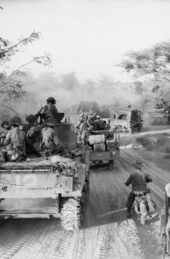The Fairfax family occupies a unique and largely forgotten place in the story of America, as the only members of the House of Lords – the Peerage – to have been long-time residents of the United States for over 150 years. First as colonialists and then as citizens of the Republic they played an active part in many of the great events that helped make America the country it is today. Then curiously, just as America was assuming its paramount position in world affairs, they left to return to Britain once more.
Best known for the exploits of the brilliant Parliamentary commander Sir Thomas Fairfax during the English Civil War and his famous victory over the Royalists at the battle of Naseby, it was with a later member of the family, Thomas 5th Lord Fairfax through his marriage to Catherine Culpeper in 1690 that the American story begins: Catherine was the heiress to an enormous tract of Northern Virginia, the Northern Neck Proprietary, which was later found to comprise over five million acres and with this union, it passed into the Fairfax family.
Their son 6th Lord Fairfax settled there in the 1740’s to administer his vast inheritance and various members of the family followed. A solitary and learned man, he played a vital and overlooked part in the early life of George Washington, training him as a surveyor and educating him in the ways of the world. The Washington’s at Mount Vernon and the Fairfax’s nearby at Belvoir were neighbours and indeed related through the marriage of George’s elder half-brother Lawrence to Anne Fairfax. So the young George became a close friend of the Fairfax family and is said to have had a passionate but unrequited love affair with Sally Cary Fairfax, the wife of George William Fairfax, a cousin of Lord Fairfax.
The position of the Fairfax family during the Revolution might well have been difficult: Ostensibly a Tory loyalist, Lord Fairfax would almost certainly have been at risk of losing his property in the aftermath, but for the family’s close relationship with George Washington. Although none played any part in the war and were left untouched by events, George William had moved to England before the outbreak of hostilities and was able to provide succour to American prisoners of war in England at great personal danger to himself. This did not go unnoticed in the new Republic, and was another fact in their favour.
Lord Fairfax’s heir, the Rev. Bryan 8th Lord Fairfax was perhaps the closest member of the family to Washington and they remained friends until the end. The last person to dine with Washington shortly before his death in 1799 he was an official mourner at his funeral.
As we enter the new century we find the Fairfax family fully committed as citizens of the new American Republic and they embraced many of the new ideas and attitudes it would bring. Thomas (9th Lord) was a follower of the religious visionary Emmanuel Swedenborg, who preached that all men were equal, and like many in the Upper South set about liberating his inherited slaves through the process of manumission.
As loyal Americans some members of the family took part in the War of 1814-16 against the British and later the American Mexican War of 1846-8.
The Gold Rush to California saw Charles Snowden Fairfax (10th Lord) head west to seek his fortune and although he found no gold, he succeeded in politics. He and his wife Ada were famous for their lavish hospitality at their home in what would later become the City of Fairfax in Marin County.
The Civil War was a low point for the Fairfax family. As Virginians they rallied to the Confederate cause but at a great cost: Their home, Vaucluse, high on a hill not far from Washington was razed to the ground by the Union army to make way for a fort and the family scattered. Two members of the family were killed in action and several wounded. By the end, there was little left so the next Lord Fairfax, Dr John Contee, (11th Lord) moved to Maryland and settled on a tobacco farm at Largo called Northampton. This would remain in the family until 1960.
Born in 1870, the author’s grandfather Albert, always known as Beech, had little schooling but was born with a steely determination to restore the family’s fame and fortune. Starting at the bottom as bank clerk in New York, he worked his way up and eventually succeeded. Settling in England in 1908 he reclaimed the family long unclaimed title and thus the family became English once more.
Hugh Fairfax is the author of Fairfax Of Virginia: The Forgotten Story Of America’s Only Peerage, 1690 -1960, published by Chiselbury.







